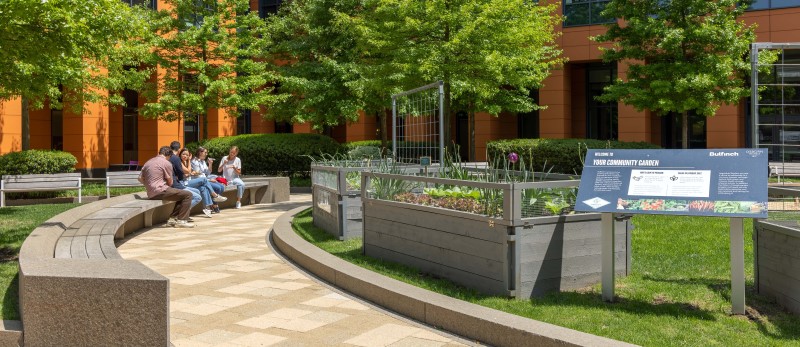Information on this page is for customers in
{{ town-name }}
Bulfinch Case Study

Bulfinch is a third-generation commercial real estate firm that specializes in the acquisition, development, repositioning and management of properties throughout the Greater Boston area. A key component of their approach is to incorporate sustainable practices throughout their portfolio, as part of their commitment to reducing their carbon footprint and to protecting and enhancing the communities in which they operate.
The Challenge
Osborn Triangle is a one-of-a-kind complex and global hub for life science and innovation. Located in Cambridge’s Kendall Square, the park is close to MIT and Harvard and many of the world’s leading life science companies. The campus is comprised of three buildings: 610 Main St., 1 Portland St. and 700 Main St. for a combined 677,000 square feet, alongside a parking garage. After Bulfinch acquired the campus, they set out on a journey to improve their energy efficiency through a series of building upgrades that would help to lower emissions, reduce costs and improve tenant satisfaction.
In partnership with Eversource and mechanical and electrical construction companies, Commonwealth Technologies, J.C. Cannistraro and EMCOR Group, Bulfinch created a plan to address inefficiencies at each of the three buildings – from old, fluorescent lighting to outdated HVAC units. Eversource and Bulfinch partnered to implement energy-efficient upgrades to address these existing issues and simultaneously ensure that they were meeting LEED and ENERGY STAR® building certification perimeters. In planning for future improvements as well, they sought to lay the groundwork to expand their EV infrastructure and meet Cambridge’s upcoming Building Energy Use Disclosure Ordinance (BEUDO) requirements from the city.
The Eversource Solution
Bulfinch and Eversource took a multifaceted approach beginning with Level 3 energy audits which, as defined by the American Society of Heating, Refrigerating, and Air-Conditioning Engineers (ASHRAE), provides building owners with a detailed, data-driven analysis of areas for improvement and potential costs.
Driven by these findings, the project team began a series of upgrades at each property, taking place over several years:
- 700 Main upgraded its LED lighting, rebuilt its HVAC system's steam trap, and installed a highly efficient rooftop unit and exhaust system with heat recovery
- 610 Main installed controls to manage its chiller and boiler plant, automatically adjusting the outside air temperature and relative humidity to reduce energy consumption, upgraded the domestic booster skid, and upgraded lighting
- 1 Portland underwent significant improvements, including lighting, domestic water skid upgrades, the installation of new heat recovery valves, new controls for its own chiller and boiler plants
In addition to these building upgrades, Bulfinch also upgraded their garage lighting and installed 83 EV charging stations, in collaboration with the Commonwealth of Massachusetts and Eversource, which provided approximately $1 million in rebates for EV charging infrastructure installation costs.*
In line with the city’s own ambitious net zero goals, Bulfinch has set a target to meet net zero carbon emissions across its portfolio by 2035. Partnering with Eversource on projects like Osborn Triangle, where they made significant upgrades to their electrical and gas systems, will help Bulfinch achieve that standard.
The Results
Bulfinch’s efforts have improved their operational efficiency while also leading to significant energy savings. As a result, Osborn Triangle is saving an estimated 1,500,000 kWh annually – the equivalent to avoiding the greenhouse gas emissions that would arise from driving over three million miles in a gas-powered car. Bulfinch is saving over 110,000 therms of gas annually and have reduced CO2 emissions by a total of over 6,000 tons. They received approximately $1.7 million in incentives through Eversource programs to help make these EV and energy efficiency upgrades possible.
Bulfinch continues to seek out and incorporate best practices in sustainability, ensuring ongoing improvement and adherence to the highest standards in environmental responsibility. The company has positioned itself as a leader in environmental stewardship within the real estate sector, and they are an example that others can and should follow, to improve their own operations while better serving their tenants and communities.
*In support of its vision for a cleaner, more efficient and reliable electric grid, which includes support for emerging technologies such as EVs, the Department of Public Utilities established regulatory construct Electric Vehicles, D.P.U. 13-182-A (2013). Since then, the Department has reviewed and approved EV program proposals by NSTAR Electric (now Eversource Energy) and National Grid. This order was similar to Chapter 169 of the Acts of 2008, An Act Relative to Green Communities, which established the Mass Save® energy efficiency programs.
The information in this case study is an accurate representation of this customer’s experience at the time of publication. Results, including cost savings, from heat pump installation and/or other energy efficiency measures can vary based on each individual customer’s situation.